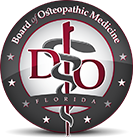Click on the appropriate tab below to see the Initial Licensing Requirements, Process, Fees, Statutes and Administrative Rules for a Temporary Certificate to Practice in an Area of Critical Need.
These DOs practice medicine as described under Full Licensure; however, to be licensed pursuant to this section, these DOs must have a current, valid license from another state. These physicians may only practice in an area of critical need; must be employed by or practice in a county health department; correctional facility; Department of Veterans’ Affairs clinic; community health center funded by s. 329, s. 330, or s. 340 of the United States Public Health Services Act; or other agency or institution that is approved by the State Surgeon General to provide health care to meet the needs of underserved populations in this state; or will practice for a limited time to address critical physician-specialty, demographic, or geographic needs for this state’s physician workforce as determined by the State Surgeon General.
General Licensure Requirements:
- Graduation from an osteopathic medical school approved by the American Osteopathic Association (AOA).
- A letter of intent to employ and affidavit regarding compensation from the agency/institution that intends to employ you. This letter must be from the agency/institution that intends to employ you and must be addressed to the Board of Osteopathic Medicine. It must also indicate whether or not you will receive compensation for the medical services provided. If you will not receive compensation for any service involving the practice of medicine, the agency/institution must submit an affidavit to that effect so that the application fee and all licensure fees, including the NICA fee, can be waived. (See section 459.0076(4), F.S.).
- Proof of current and valid licensure to practice in any jurisdiction in the United States.
- If the applicant has not actively practiced during the prior 3 years and the board determines that the applicant may lack clinical competency, possess diminished or inadequate skills, lack necessary medical knowledge, or exhibit patterns of deficits in clinical decision-making, the board may impose additional terms or conditions of licensure.
- File a completed application and pay all required fees. Refer to application instructions for a list of specific documents and information needed.
Applicants with Health History
If a “Yes” response was provided to any of the questions in this section, provide the following documents directly to the board office:
A letter from a Licensed Health Care Practitioner, who is qualified by skill and training to address the condition identified, which explains the impact the condition may have on the ability to practice the profession with reasonable skill and safety. The letter must specify that the applicant is safe to practice the profession without restrictions or specifically indicate the restrictions that are necessary. Documentation provided must be dated within one year of the application date.
A written self-explanation, identifying the medical condition(s) or occurrence(s); and current status.
Applicants with Disciplinary History
Applicants who have ever been denied licensure, had disciplinary action taken against their license, or have action pending against their license to practice any health care related profession by a licensing authority are required to submit the following documentation to the board:
Self-Explanation – Applicants who have listed disciplinary action on the application must submit a letter in your own words describing the circumstances of the action.
Agency Records – All relevant documentation regarding the action should be sent to the board office by the licensing agency. If the records are not available, you must have a letter on agency letterhead sent from the licensing agency attesting to their unavailability.
Applicants with Criminal History
Any applicant who has ever been found guilty of or pled guilty or no contest/nolo contendere to any charge other than a minor traffic offense must list each offense on the application. Failure to disclose criminal history may result in denial of your application. Each application is reviewed on its own merits.
The Board of Osteopathic Medicine has created guidelines for specific offenses to be cleared in the board office; however, staff cannot make determinations in advance as laws and rules do change over time. Violent crimes and repeat offenders are required to be presented to the Board of Osteopathic Medicine for review. Evidence of rehabilitation is important to the board members when making licensure decisions.
Applicants with prior criminal convictions are required to submit the following documentation to the board:
Self-Explanation – Applicants who have listed offenses on the application must submit a letter in your own words describing the circumstances of the offense.
Final Dispositions/Arrest Records – Final disposition records for offenses can be obtained at the clerk of the court in the arresting jurisdiction. If the records are not available, you must have a letter on court letterhead sent from the clerk of the court attesting to their unavailability.
Completion of Probation/Parole/Sanctions – Probation and financial sanction records for offenses can be obtained at the clerk of the court in the arresting jurisdiction. Parole records for offenses can be obtained from the Department of Corrections or at the clerk of the court in the arresting jurisdiction. If the records are not available, you must have a letter on court letterhead sent from the clerk of the court attesting to their unavailability.
Health Care Fraud, Disqualification for Licensure, Certificate, or Registration
Effective July 1, 2012, Section 456.0635, Florida Statutes (F.S.), provides that health care boards or the department shall refuse to issue a license, certificate or registration and shall refuse to admit a candidate for examination if the applicant:
- Has been convicted of, or entered a plea of guilty or nolo contendere to, regardless of adjudication, a felony under Chapter 409, F.S., (relating to social and economic assistance), Chapter 817, F.S., (relating to fraudulent practices), Chapter 893, F.S., (relating to drug abuse prevention and control) or a similar felony offense(s) in another state or jurisdiction unless the candidate or applicant has successfully completed a drug court program for that felony and provides proof that the plea has been withdrawn or the charges have been dismissed. Any such conviction or plea shall exclude the applicant or candidate from licensure, examination, certification, or registration, unless the sentence and any subsequent period of probation for such conviction or plea ended:
- For the felonies of the first or second degree, more than 15 years from the date of the plea, sentence and completion of any subsequent probation;
- For the felonies of the third degree, more than 10 years from the date of the plea, sentence and completion of any subsequent probation;
- For the felonies of the third degree under section 893.13(6)(a), F.S., more than five years from the date of the plea, sentence and completion of any subsequent probation;
- Has been convicted of, or entered a plea of guilty or nolo contendere to, regardless of adjudication, a felony under 21 U.S.C. ss. 801-970 (relating to controlled substances) or 42 U.S.C. ss. 1395-1396 (relating to public health, welfare, Medicare and Medicaid issues), unless the sentence and any subsequent period of probation for such conviction or pleas ended more than 15 years prior to the date of the application;
- Has been terminated for cause from the Florida Medicaid program pursuant to section 409.913, F.S., unless the candidate or applicant has been in good standing with the Florida Medicaid program for the most recent five years;
- Has been terminated for cause, pursuant to the appeals procedures established by the state or Federal Government, from any other state Medicaid program, unless the candidate or applicant has been in good standing with a state Medicaid program for the most recent five years and the termination occurred at least 20 years before the date of the application;
- Is currently listed on the United States Department of Health and Human Services Office of Inspector General’s List of Excluded Individuals and Entities.
Section 456.013(1)(a), Florida Statutes, provides that a licensure application and fee are valid for one year. Application fees are non-refundable.
The licensing process involves the collection of credentials from the applicant and other sources, such as hospitals, medical schools, other states, etc. Once documents are received, an application specialist will review them; however, it may be necessary for the application specialist to request additional information or clarification regarding a particular document. Our goal is to review materials as quickly as possible, but we must be thorough. We process applications, mail, e-mails, and telephone calls in date order.
Staff will mail you a deficiency letter approximately two weeks after receiving your application, so please refrain from contacting our office until after you have received your initial deficiency letter.
Some applicants may have to appear before the Board at one of their regularly scheduled meetings before a license can be issued. Reasons for an appearance include previous disciplinary action in another state, malpractice, criminal history, health history and other application deficiencies. Having one of these issues is not an automatic appearance as each application is reviewed on a case by case basis. You will be notified in writing if your appearance will be required.
We recommend that you do not make any commitments based upon expectation of licensure until you are actually licensed. One application is not accelerated at the expense of another- all applicants are handled equally and fairly.
Application Fee: $300 (non-refundable)
Initial Licensure Fee: $429.00
Florida Statutes
You will be connected to the Florida Legislature website, which is the official custodian of the statutes.
Chapter 459: Osteopathic Medicine
Chapter 456: Health Professions and Occupations: General Provisions
Chapter 120: Administrative Procedure Act
Florida Administrative Code (F.A.C.)
You will be connected to the Florida Department of State: State Library and Archives of Florida website, which is the official custodian of the administrative codes.
Rules: Chapter 64B15: Board of Osteopathic Medicine
Rules: Chapter 64B: Division of Medical Quality Assurance





